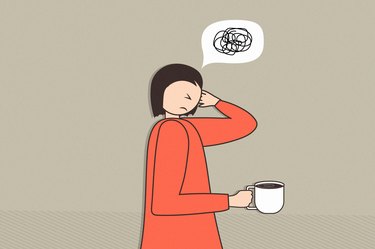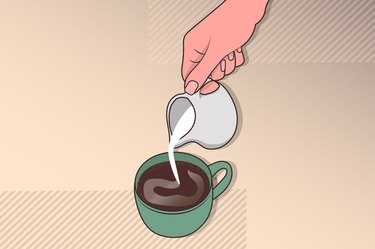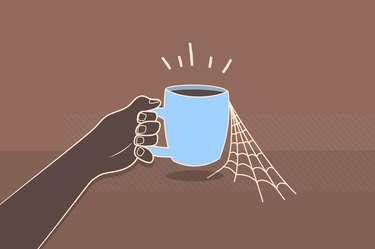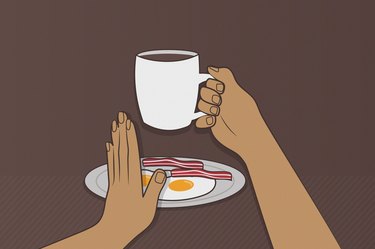
So you drank one too many cocktails last night and now you're paying for it the next day. We've all been there.
Likewise, most of us have developed strategies to deal with the dreaded hangover. Some opt to pop an aspirin while others look to a little "hair of the dog" (not the best idea, by the way).
Video of the Day
Video of the Day
Still, many turn to caffeine as a hangover cure. In theory this makes sense: Hangovers infamously cause headaches and fatigue, and what better way to squelch these symptoms than with a revitalizing cup of joe?
But you may want to think twice before drinking coffee when you're hungover, says dietitian Laura Burak, RD, founder of GetNaked Nutrition and author of Slim Down With Smoothies: A 21-Day Plan for Weight Loss and Good Health.
Read on to learn why your brew may be a bad beverage choice after a booze session and what to drink instead.
4 Risks of Drinking Coffee When You're Hungover
Sometimes it's bad to drink coffee when you're hungover because it can exacerbate your symptoms. Here are just a few examples:
1. It’s Doubly Dehydrating
Dehydration is the cause for a lot of the unpleasant side effects (think: fatigue, nausea and dizziness) we experience when hungover. But your morning brew might just deepen your dehydration woes.
Here's why: "Coffee can be a bit of a diuretic [i.e., it makes you pee], so drinking it when hungover can be like a double dehydrating whammy," Burak says. That's because instead of replacing fluids to help your body restore its balance, you continue to lose more through urine.
And this can intensify your hangover symptoms. In particular, being parched can produce a pounding headache. Indeed, when you fail to get enough fluids, your brain shrinks, slightly receding from the skull, according to the Cleveland Clinic. And this places pressure on nerves, which can cause head pain.
"On the other hand, skipping a daily cup of coffee can also cause a headache due to caffeine withdrawal," Burak says. Ugh, talk about a catch 22.
While everyone's body will respond differently, the safest strategy is to stay hydrated with plenty of H2O whether you choose to enjoy — or forgo — your favorite roast after a night of drinking, Burak says.
2. It Can Amplify Anxiety
Drinking can affect dopamine levels, which can disrupt other neurotransmitters and negatively affect your mood the next day, according to Northwestern Medicine. This after-alcohol effect even has a name: "hangxiety."
It's true: When the relaxing effects of alcohol fade, your nervous system must recalibrate, and this can result in increased restlessness, per the Cleveland Clinic. Which is why anxiety, depression and irritability are all signs of a hangover.
In fact, one July 2021 study in Alcohol and Alcoholism found that hangovers can wreak havoc on emotional regulation, making it tougher to control one's feelings.
The problem is, adding a cup of coffee to the mix might make your mood worse. Due to its caffeine content, coffee is known to increase anxiety and jittery feelings for some people, Burak says.
While this is especially true for those with a caffeine sensitivity, even folks who sip their joe religiously without side effects can still experience the same jitters when hungover, she says.
"So when you're nursing a hangover, you may want to skip coffee or opt for a less caffeinated decaf option so as not to exacerbate your symptoms," Burak says.
But keep in mind: Decaf still contains a small quantity of caffeine (2 milligrams per cup compared to the 95 milligrams in regular coffee), according to the National Coffee Association.
3. It Can Trigger Tummy Troubles
Sipping on spirits can sabotage even the strongest stomach. That's because liquor irritates the stomach and intestinal lining, according to the Cleveland Clinic. Which is why drinking can derail your digestive system, causing nausea, vomiting and stomachaches.
But having your morning brew during a hangover may trigger twice the tummy troubles. "While alcohol can disrupt your GI tract and send you to the bathroom, frankly, so can coffee," Burak says.
Not only does caffeine act as a stimulant, speeding up contractions in your gut, but its acid and/or fat content can also bring on bothersome bloating, heartburn and acid reflux, per the Cleveland Clinic.
"So if you're already experiencing an upset stomach, consider skipping the coffee and opting for water instead to hydrate you and help your body rid of the toxins quicker," Burak says.
4. It Can Disrupt Sleep
Considered a sedative, alcohol may make you sleepy at first. But over the course of the night, it can zap your zzzs.
Here's why: Booze interrupts the brain's release of melatonin, a sleep-supporting hormone, and can reduce REM sleep (i.e., the deep stage of sleep when dreams occur), according to Piedmont Healthcare.
So it's no surprise why you wake up feeling fatigued during a hangover. Now throw another stimulant like caffeine into the equation, and this creates the perfect storm for further sabotaging your sleep, Burak says.
What's worse, if you're using a combo of alcohol and caffeine regularly, this sleep shortage can become a larger problem. "Lack of quality sleep is a serious health concern that can affect every other area of your life," Burak says.
She's right. Insufficient sleep is associated many chronic health issues, such as heart disease, kidney disease, high blood pressure, diabetes, stroke, obesity and depression, according to the National Heart, Lung, and Blood Institute.
Moral of the story: Drink in moderation. And don't hit the hay right away, so the booze has time to flush from your system, per Piedmont Healthcare.
Same goes for your coffee habit. "Make sure to drink caffeine early enough in the day so it doesn't interfere with bedtime," Burak says.
What to Drink Instead to Help With a Hangover
If you want to recover and heal from a hangover, trade in your coffee mug for these hyper-hydrating beverages instead. The following options will help restore lost fluid and electrolytes, according to Burak:
- Plain water
- Electrolyte water
- Sports drinks (in moderation to limit sugar)
- Natural fruit juices (with no added sugar)
So, How Bad Is It Really to Drink Coffee When You’re Hungover?
Though you might crave your morning cup during a hangover, coffee can actually make your hangover worse. The caffeine and other content in coffee — like acid — may just hamper your existing hangover symptoms, intensifying the effects of dehydration, anxiety, GI irritation and sleep problems.
All this is to say, hold off on your brew until you feel better.
- Cleveland Clinic: “Dehydration Headache”
- Northwestern Medicine: “Quick Dose: What a Hangover Does to Your Brain”
- Alcohol and Alcoholism: “Does Alcohol Hangover Affect Emotion Regulation Capacity? Evidence From a Naturalistic Cross-Over Study Design”
- National Coffee Association: “All About Decaffeinated Coffee”
- Cleveland Clinic: “Hangover”
- Cleveland Clinic: “Why Does Coffee Bother My Stomach?”
- Piedmont Healthcare: “How does alcohol affect your sleep?”
- National Heart, Lung, and Blood Institute: “What Are Sleep Deprivation and Deficiency?”



